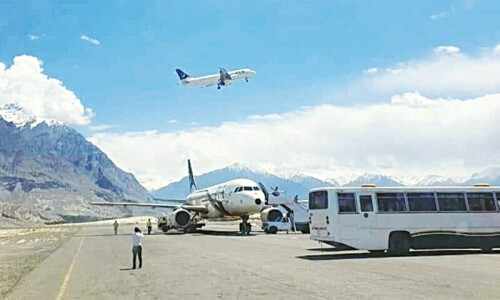YANGON: An independent human rights group said on Tuesday it had obtained official documents directly implicating the Myanmar government in abusive and discriminatory policies targeting the country’s long-persecuted minority Rohingya Muslim community.
Matthew Smith, executive director of the Southeast Asian-based Fortify Rights, said a dozen leaked official and public records detailed restrictions on travel, home repair, marriage and families.
While these policies had long been known, in some cases dating back decades, it was the first time the official orders had been made public, he said, describing the chilling effect of seeing them in writing.
“It represents a level of planning and knowledge among Myanmar authorities that raises the abuses to the threshold of crimes against humanity,” Mr Smith said. “These abuses have been carried out for years with complete impunity, driving the population into the ground.”
Presidential spokesman Ye Htut did not respond to requests for comment, but was quoted by the Myanmar Times as saying government officials “do not remark on baseless accusations from Bengali (Rohingya) lobby groups”.
Myanmar, a predominantly Buddhist nation of 60 million, only recently emerged from a half-century of brutal military rule. It has been hit by sectarian violence since it began its bumpy transition to democracy in 2011.
As many as 280 people have been killed, most of them Rohingya attacked by Buddhist mobs, and another 140,000 forced to flee their homes.
Nowhere have Rohingya – described by the UN as one of the most persecuted religious minorities in the world – been more pursued than in Rakhine state, which sits along the coast of the Bay of Bengal and is cut off from the rest of the country by a mountain range.
It is home to almost all of Myanmar’s 1.3 million Rohingya. Though many are descended from families who have been there for generations, the government says they are Bangladeshi and has denied them citizenship.
Confidential documents published in the 79-page report reveal that official orders issued by Rakhine state authorities from 1993 to 2008 outline consistent state policies restricting Rohingya. Some of the “regional orders” – dated 1993, 2005 and 2008 – are copied to various departments falling under state and central government jurisdictions.
However, they also had been discussed on the record since 2011, the group said, adding that to the best of its knowledge almost all the policies were still in place and were being enforced.
The report said the orders laid the groundwork for a two-child policy in Maungdaw and Buthidaung townships, requiring Rohingya “who have permission to marry” to “limit the number of children, in order to control the birth rate so that there is enough food and shelter”.
One document gives detailed instructions for officials to confirm that women are the real mothers of infants, forcing them to publicly breastfeed if it’s suspected that they are trying to claim others' children as their own.—AP















































Dear visitor, the comments section is undergoing an overhaul and will return soon.